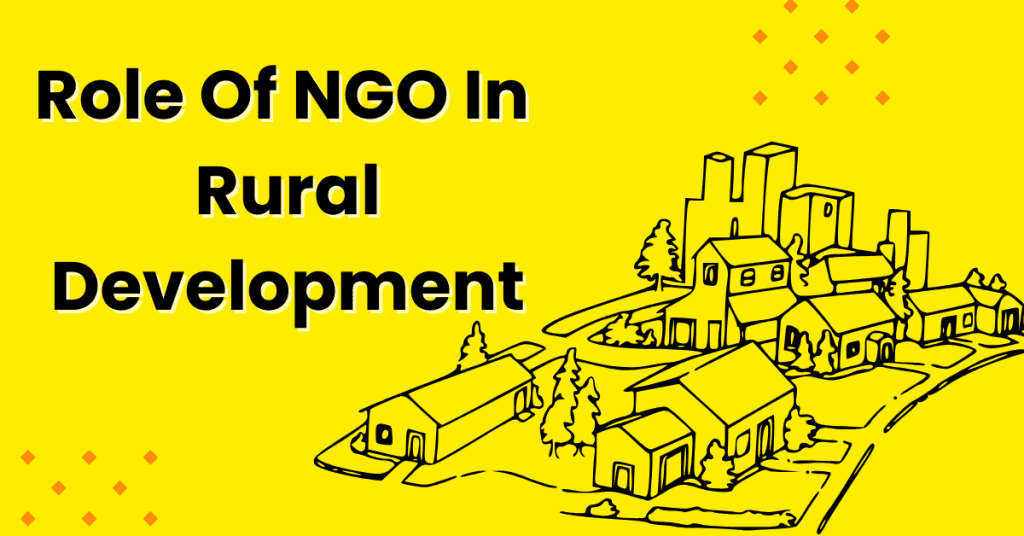The role of NGO in Rural development of India requirements is vast, stretching far beyond just economic growth. It aims to enhance lives, give people more power, and forge a solid society. This calls for cooperation across various government agencies, departments, and even non-profit organizations (NGOs).
If you were a doctor, you would treat a single village rather than a whole city. NGOs contribute a customized touch like that to rural development. Nonprofits can modify their strategies to meet the particular requirements of any community, in contrast to the inflexible framework of government initiatives. They resemble neighbors who have a thorough understanding of the area, including its vulnerabilities and hidden assets.
Their desire to change the world and their familiarity with the area inspire their inventiveness. They are not afraid to take chances, try new things, and come up with original solutions that don’t have to adhere to the one-size-fits-all rules of a government project. In the end, what makes NGOs such a powerful force for good in rural India is their comprehension, adaptability, and unwavering dedication.
However, defining “NGO” can be tricky. There are several ways, each focusing on different areas like human rights, the environment, or development work. Some work in one village, while others operate across the country. The key takeaway is that NGOs are valuable partners in India’s development journey. They bring flexibility, local knowledge, and a strong sense of purpose, making them essential players in building a better future for all.
History of NGO in Shaping Rural India
Helping others has always been woven into the fabric of Indian culture. Even after independence, Mahatma Gandhi envisioned transforming the national party into a “Lok Seva Sangh” or a public service organization. While this wasn’t the chosen path, his followers sparked the first wave of NGOs, tackling social and economic challenges across the country.
Then, in the 1960s, it became clear that government programs alone couldn’t fully address rural development needs. This birthed the second wave of NGOs, focusing on grassroots work and empowered by supportive government policies. Since then, as government goals and policies have changed, NGOs’ roles in rural India have continued to change.
Take the sixth five-year plan (1980-85) for example. Here, the government saw a fresh role for NGOs: helping communities become self-reliant. The seventh plan (1985-1990) further envisioned NGOs actively building communities that could tap into their resources – local knowledge, skills, and underutilized human potential – for their development. This was where NGOs thrived, their close connections with villagers making such transformations smoother.
So, throughout history, NGOs have been crucial partners in shaping a better rural India, adapting to changing needs and working hand-in-hand with communities to build a brighter future.
NGO, A Bridge Between Dreams and Reality of Rural Development
Role of NGO in rural development in India Bridging the vast gap in India’s development story, NGOs shine in rural areas. Their flexibility allows them to tailor solutions to each village’s unique needs, while their deep local knowledge and passionate commitment fuel innovative approaches that empower communities, improve education and healthcare, and fight poverty. From child marriage prevention to solar engineering, these dedicated organizations are transforming lives, one village at a time, proving that even the tallest mountains of rural challenges can be climbed, step by step.
To achieve this, a holistic vision and collaborative efforts involving various departments, agencies, and even NGOs are required. Due to the overwhelming demand, India is seeing a tremendous increase in the number of NGOs; now, there are between more than 30,000 active NGOs in the country.
Hurdles On The Way To Rural Development
- Funding: Dependence on grants and donations restricts flexibility and limits responsiveness to local needs.
- Tunnels of the government: Slow processes and red tape delay progress and slow down the impact.
- Traditional mindsets: Resistance to new ideas and technologies can make development slow and challenging.
- Lack of infrastructure: Basic needs like water, electricity, schools, and communication are often missing, hindering progress.
- Social and cultural barriers: Differences in customs and beliefs can create friction and complicate collaboration.
- Political interference and administrative hurdles: External pressures can stall progress and hinder effective implementation.
- Lack of motivation and interest: Some villagers may not actively participate in development efforts, requiring additional engagement strategies.
What is the Role of NGO in Rural Development?
Picture a village, with farmers worried about crops, and families with no doctor nearby. Now picture helping hands – NGOs! They teach farmers new tricks, build clinics closer to homes, and open schools that light up minds. But they do more than just hand out stuff. They help women run shops, train young people for jobs, and get everyone involved in making their village better. Unlike big, slow helpers, NGOs can bend their ways to fit each village, whether it’s stopping child marriage in the hills or bringing light to faraway places.
Of course, they face problems like not having enough money or dealing with red tape, but their fire for helping villages never goes out. They work side-by-side with people, respecting their customs and beliefs, so everyone gets a chance to shine. In the end, the role of rural development with the help of NGOs is not just a development; it’s a hope weaver, sewing a brighter future for rural India, one village, one smile at a time.
Significant Role of NGOs in Rural Development
Remember how letting businesses take the lead boosted India’s growth? We need a similar shift for NGOs in rural areas. Instead of just relying on handouts, they should be empowered to work like mini-entrepreneurs. Think micro-finance, micro-insurance, and helping villagers start their businesses. This could be the key to improving rural conditions and bringing prosperity to everyone. So, let’s give NGOs the tools and freedom to be the changemakers they were meant to be!
Conclusion
Growing numbers of business owners are concentrating on the rural sector as they see its potential. Thus, the role of NGO in rural development is to encourage rural entrepreneurship is crucial for creating profitable jobs and closing the growing gaps in the population between rural and urban areas.
To reduce poverty and boost farm output, rural entrepreneurship is essential. The path to becoming a developed nation from a developing one is through rural entrepreneurship. Thus, the importance of integrated rural development projects should be emphasized more.
The problem is that most young people in rural regions don’t think starting their own business is a feasible career option. Thus, it is necessary to provide training and continuing support mechanisms to encourage young people in rural areas to consider entrepreneurship as a vocation.
Related Posts:
Old Age Home in MP ( Madhya Pradesh )


I have a great command of sophisticated language and literature because I am an artist at heart as well as a writer by profession. I am able to constantly produce work of a high quality because of my knowledge. I’m well-known for my versatility and am an excellent writer of both creative and technical content. To write content that is both entertaining and customized, I take the approach of getting to know the interests and preferences of my targeted audience.

